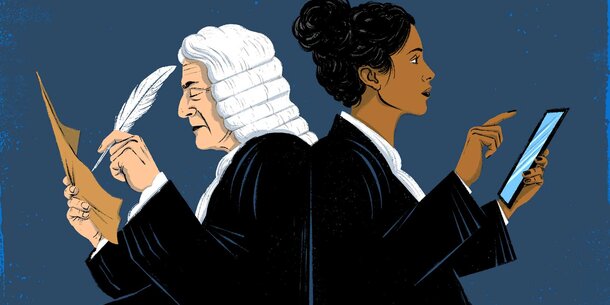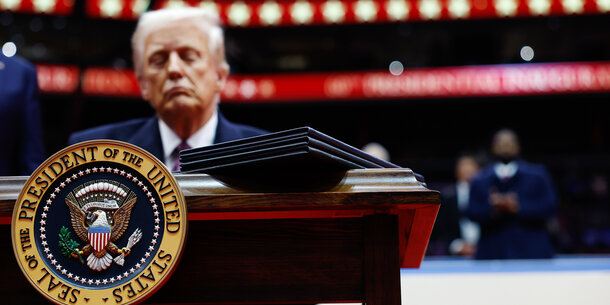The Supreme Court’s 2024 term saw professional historians weigh in on a wide variety of cases, ranging from birthright citizenship and racial gerrymandering to medical treatments for transgender minors and the First Amendment.
This annotated guide collects their work from the term. The Brennan Center reviewed the Court’s dockets to identify all the friend-of-the-court briefs that focused on a historical matter and featured at least one academic historian as a signatory. Summaries of their main points and links to the full texts are below.
To learn more about the Brennan Center’s efforts to respond to abuses of history in the courts, visit our project page, which includes analysis of new judicial opinions and emerging legal trends, and the Historians Council on the Constitution page, which collects the Brennan Center’s ever-expanding work with academic historians.
Trump v. Casa
The Supreme Court received multiple filings from historians in Trump v. Casa, a case that raised questions about the legality of nationwide injunctions barring the Trump administration’s executive order rescinding birthright citizenship. The opinion is available here.
Six legal historians with expertise in the history of equity filed a brief supporting the injunctions as traditional equitable remedies. The brief explains that courts of equity historically granted injunctions that protected both parties and non-parties to a case, as well as injunctions that had very broad scopes. The amici supply additional historical context to help explain the relative lack of nationwide injunctions prior to the 20th century, pointing to changes in sovereign immunity, jurisdiction, and venue that eliminated legal and practical hurdles to those injunctions.
Three legal historians and scholars of immigration law and history filed a brief in support of nationwide injunctions and in opposition to the executive order. The brief explains that the order threatens to disproportionately impact Asian Americans and reverse “a century’s worth of efforts” to ensure equality for Asian Americans. Among other things, the historians show the importance of constitutional guarantees of birthright citizenship for Asian Americans facing exclusionary immigration and naturalization policies, which, throughout the 19th and 20th centuries, denied them pathways to naturalization.
Louisiana v. Callais and Robinson v. Callais
Three historians with expertise in the history of Louisiana and the American South filed a brief in Louisiana v. Callais and Robinson v. Callais, two cases that considered whether a remedial congressional map for Louisiana was an unconstitutional racial gerrymander. The brief, filed in support of the mapmaker’s creation of a second majority-Black congressional district, argues that the district encompassed a well-established community of interest united by a shared history and common needs, including a common lineage of slavery. The historians further show that the residents of the district experience hardships stemming from their shared experiences of racial discrimination. This case will be reargued in fall 2025.
United States v. Skrmetti
The American Historical Association, Organization of American Historians, LGBTQ+ History Association, and eight historians with expertise in the history of gender, sexuality, and medicine filed a brief in United States v. Skrmetti, a case that considered whether a Tennessee bill restricting certain medical treatments for transgender minors violates the 14th Amendment’s Equal Protection Clause. The brief, filed in support of the transgender minors, explains that the medical diagnosis of gender dysphoria has been recognized, treated, and relieved through gender-affirming medical interventions dating back centuries. The amici further show that the medical interventions threatened by the Tennessee bill, which include surgery and hormone therapy, are “well-established, mainstream forms of health care” with deep historical pedigrees. The opinion is available here.
Free Speech Coalition v. Paxton
18 scholars of the First Amendment filed a brief in Free Speech Coalition v. Paxton, a case that considered the constitutionality of a Texas law mandating age verification methods for pornography websites. The brief argues that laws restricting children’s access to pornography are consistent with the framers’ understanding of the First Amendment. According to the amici, the framers were “not free-speech absolutists” and recognized the role of the state in prohibiting access to obscene materials. The opinion is available here.
Oklahoma Statewide Charter School Board v. Drummond
Eighteen historians and legal scholars with expertise in constitutional history and the First Amendment filed a brief in Oklahoma Statewide Charter School Board v. Drummond, a case that considered, among other things, whether the Free Exercise Clause requires a state to provide financial support to religious schools when the state also provides financial support to nongovernmental secular entities that operate schools. The brief argues that state and local governments are not required to provide public funding under the Free Exercise Clause. The brief examines federal and state funding practices from the founding era through the early 19th century to demonstrate that “the free-exercise principle was not originally understood to include the right to public funding of religious schools.” The opinion is available here.




